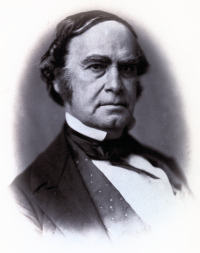Washington Jany 26. 1861.
My dear wife
We were glad to receive your letter to Sadie last night, and very glad to hear you and Caddie are so well. Some sore throat prevails here. Sadie has been complaining of it for a day or two, but she is about and attended a party with me last night at Mr. Greens, the old friend who lives in a splendid mansion near the Observatory. I had never been there, and we thought we must accept of his kind invitation after so many acts of courtesy received from him during the past 3 years. We were very kindly received and elegantly entertained.
Mr. Tate, his sister in law, and Dr. Tate brother in law are staying there, and I have seen no establishment superior to it in Washington. Mrs. Tate sent her regards to you, saying that she became somewhat acquainted with you two years ago. Henry did not go with us because he and Sadie had by some mistake, made another appointment at Judge Lawrance, where there was also a small and pleasant party. Ned Sturges, who is still with us went and spent the evening at Mr. Cox’ quarters.
The public matters move forward in the same downward direction, but precipitation is not so rapid. Kentucky and other border states are disposed to look before they leap.
I have felt very little concern about the defenses of this city, because I have great confidence in General Scott who ought to provide against any pending danger.
We are supposed to be a deliberative body, and although we ought to assist in carrying out plans, we ought not to have the trouble and embarrassment of details or determination of the question of our own fortification. I say this to explain to you why we in the Congress do not make more fuss about the matter.
The force here is still very insignificant and the Chairman of our Military Committee1 has so intimated to the Secretary of War2 but the Department replies that the President is averse to calling out more force and against the introduction of a bill authorizing him to call out force. The object is to let matters run on, slipshod, till Mr. Lincoln comes in, and then if we are all assassinated Buchanan would say “Shake not thy gory locks at me thou canst not say I did it.” But my hope is that neither Virginia or Maryland will adopt precipitation and without the secession of these States, there is little or no danger of any attack on this city.
Besides such a movement could not be made in this country without more of a note of preparation.
Henry is enjoying himself, and I hope he will stay a week or two before going west.
He has a bed in my room, so that Mrs. Joy will only charge something like day boarding. In this way it will not cost much more that it would in Omaha.
Dear little Caddie, I am very glad you are well and growing larger every day. I hope you will read me a pretty story when I get home. I tell you daughter these little sisters here are not much better than your dollie– Indeed they are not nice enough to make sisters to you and I am not willing to buy them.
You may think Cousin Helin got a very pretty little Cousin and therefore I might get such a one for you; but I tell you there are no more of that sort. Mrs. Morris’ baby has black hair, and I don’t like black headed babies–do you? Besides she won’t sell hers at any price. Don’t you think she is green? I think it cries and bitea her too! Well, if I cannot get a little sister for you, perhaps I can get you a little book or a little pairsol or something else
You tell me something that will please you just as well as a live sister baby.
Ever Affectionately yours
Saml. R. Curtis
1. Benjamin Stanton. representative from Ohio 1851-1858, 1856-1861.
2. Joseph Holt. a Kentucky Democrat. Appointed Commissioner of Patents 1857 to succeed Charles Mason of Keokuk, Iowa, Holt was designated Postmaster General in 1859. A sympathiser of Southern sentiment at this time, he inclined to the Union cause when appointed Secretary of War January 1, 1861, to succeed John B. Floyd, resigned. He actively sought to keep Kentucky in the Union, and later, as Judge Advocate General under Lincoln and Johnson supported the Radicals in Congress. See D. A. B. 9, 181-183.
